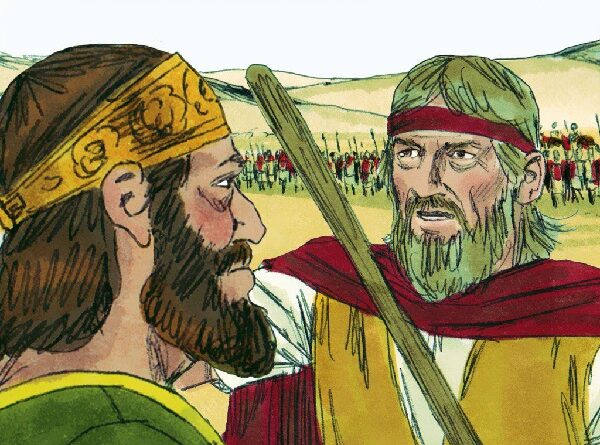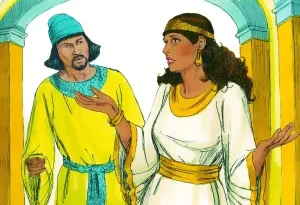The story of jeroboam and rehoboam die – यारोबाम और रहूबियाम की मृत्यु की कहानी
The story of Jeroboam and Rehoboam and their eventual deaths is a significant part of the biblical narrative, detailing the division of Israel into two kingdoms and the reigns of these two kings. Both Jeroboam and Rehoboam played crucial roles in the early years of this divided monarchy. Here’s an account of their lives, reigns, and eventual deaths:
After the death of King Solomon, his kingdom was divided into two parts: the northern kingdom of Israel and the southern kingdom of Judah. This division occurred due to Solomon’s sins of idolatry, as he turned away from God in his later years, influenced by his foreign wives (1 Kings 11). God declared through the prophet Ahijah that the kingdom would be torn from Solomon’s line, though not completely, for the sake of David.
Jeroboam was one of Solomon’s officials who rebelled against him. God promised Jeroboam that he would become king over ten tribes of Israel (the northern kingdom) after Solomon’s death (1 Kings 11:31-35). However, Jeroboam would not rule over Judah and Benjamin, the two southern tribes, which would remain under the rule of Solomon’s son, Rehoboam.
Rehoboam, Solomon’s son, inherited the throne of the united kingdom but quickly lost the loyalty of the northern tribes due to his harsh policies and refusal to lighten the burdens placed on the people by his father. This led to the kingdom’s split (1 Kings 12).
After the northern tribes broke away, Jeroboam became the first king of the newly established kingdom of Israel. However, to secure his power and prevent the people from returning to the house of David, Jeroboam led the nation into idolatry. He set up golden calves at Bethel and Dan and established a new priesthood and religious practices, leading the people away from the worship of God in Jerusalem (1 Kings 12:26-33).
Jeroboam’s actions displeased God, and He sent a prophet to warn Jeroboam that his house would be destroyed. Later, Jeroboam’s son, Abijah, fell ill, and Jeroboam sent his wife in disguise to the prophet Ahijah to inquire about the boy’s fate. Ahijah pronounced judgment on Jeroboam, declaring that his dynasty would be cut off because of his idolatry. Shortly after, Jeroboam’s son died, fulfilling part of the prophecy (1 Kings 14:1-18).
Jeroboam reigned for 22 years in Israel, and after his death, his son Nadab succeeded him (1 Kings 14:20). Jeroboam’s legacy was one of sin and idolatry, and his name became synonymous with leading Israel into sin. His dynasty was later completely wiped out by Baasha, as prophesied (1 Kings 15:28-30).
Rehoboam, Solomon’s son, ruled over the southern kingdom of Judah. His reign began with the division of the kingdom when the northern tribes rebelled. Rehoboam sought to reunify the kingdom by force, but God sent a prophet to stop him, telling him that the division was His will (1 Kings 12:22-24).
Rehoboam’s reign in Judah was marked by a mixture of faithfulness and apostasy. Initially, Rehoboam and the people of Judah followed God, but over time, they also fell into idolatry, setting up high places, sacred stones, and Asherah poles, which were symbols of pagan worship (1 Kings 14:21-24). This unfaithfulness provoked God’s anger, and as a result, Judah faced several difficulties, including an invasion by the Egyptian king Shishak during Rehoboam’s reign. Shishak plundered the treasures of the temple and the royal palace (1 Kings 14:25-28; 2 Chronicles 12:1-12).
After ruling for 17 years, Rehoboam died and was buried in the City of David, and his son Abijah succeeded him as king of Judah (1 Kings 14:31). His reign, like Jeroboam’s, was characterized by a failure to remain faithful to God.
led the northern kingdom of Israel into sin by establishing false worship practices and turning the people away from God. His dynasty was eventually wiped out as a result of his disobedience. ruled over Judah, but his harshness and failure to listen to wise counsel caused the kingdom to split. His reign was marred by idolatry and foreign invasions.
Their stories serve as warnings about the consequences of forsaking God’s commandments and the importance of wise and godly leadership. Both kings died, leaving behind legacies that contributed to the spiritual decline of their respective kingdoms.
The story of jeroboam and rehoboam die – यारोबाम और रहूबियाम की मृत्यु की कहानी



